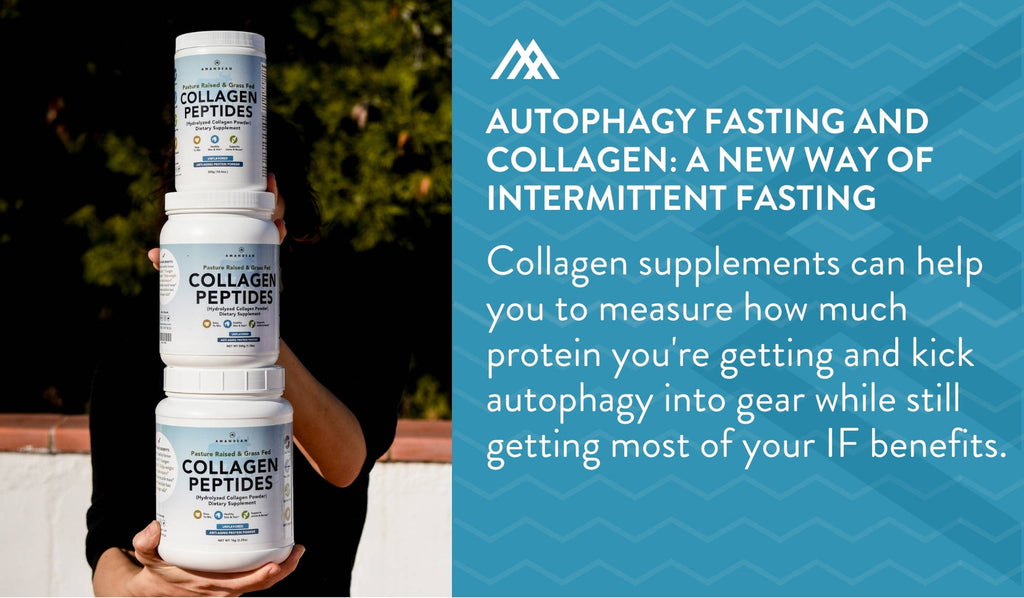Your Cart is Empty

January 20, 2023 7 min read

The technical autophagy definition (according to cancer.gov) is “A process by which a cell breaks down and destroys old, damaged, or abnormal proteins and other substances in its cytoplasm (the fluid inside a cell). The breakdown products are then recycled for important cell functions, especially during periods of stress or starvation.”
An easier way to understand autophagy is to take a look at how our smartphones work. Similar to smartphones, appliances, and cars, the cells found in the human body have their own form of "planned obsolescence". Just like how our phones need constant updates to continue functioning or get totally replaced with a new model every other year or so, the cells found in the human body also have a defined lifecycle and reach a point where they can no longer be maintained or used by the body.

During autophagy, cellular waste is delivered to lysosomes which are then degraded, recycled, and used to generate molecules that fuel the production of new optimally-performing cells. There are three forms of autophagy: macroautophagy, microautophagy, and chaperone-mediated autophagy. Autophagy, literally meaning "self-eating", is like our body's form of an operating system update.
As we age, we're exposed to more and more free radicals from the foods we eat, the air we breathe, and the products we use every day. This taxes our cells and causes them to become damaged at a much faster rate. These damaged cells, organelles, and aggregates then linger in our connective tissues and organs and can cause inflammation and disease. Autophagy takes the burden of maintaining these inefficient and often useless cells away from the body and frees it up to fight inflammation, deter the development of diseases, and function optimally.

Autophagy is a natural and necessary function that "cleans up" and protects the body. Its benefits include:

So, great! Now we know that our bodies have this incredible cellular-recycling capability... but how can we take advantage of our body's natural ability to remove junky cells and make it happen more often? Autophagy occurs naturally in all humans, but it wasn't until 2016 that researcher Yoshinori Ohsumi studied the process of autophagy and found that we can induce it. Autophagic fasting is a process of intermittent fasting that triggers an autophagic response by managing our dietary intake and protein levels. Studies have even found that intermittent fasting can lead to greater insulin sensitivity to minimize metabolic conditions like diabetes, vascular disease, and higher levels of inflammation.
Before we get too deep into autophagy, let’s do a quick intermittent fasting crash course. Intermittent fasting (or IF) is not a diet or week-long “food ban.” Rather, it’s an eating pattern that maximizes your body’s ability to utilize all its available energy sources and burn fat. Intermittent fasting is a pattern that intermixes fasting periods with eating windows. For example, the 16:8 fast is a 16-hour fast followed by 8 hours to eat whatever you want (preferably something healthy), and the 5:2 method is 5 days of normal eating with two 24-hour fasts.
Intermittent fasts of various lengths have different stages that range from fatigue to ketosis (fat burning), autophagy, HGH production, and improved immune function. All of this is due to the scarcity of food which triggers the body to repair and fuel itself rather than using food as per usual. In a nutshell, this is how fasting induces autophagy. When fasting, your glucose and insulin levels drop. This then increases your levels of glucagon, a naturally produced hormone that stabilizes blood sugar levels. The presence of this hormone then signals the need for autophagy, e voila! You're on the road.
Getting the most out of your fast of any length can be done with lots of water, some supplements, and, of course, time. Protein cycling, or fluctuating your protein levels on fasting vs non-fasting days, can also trigger an autophagic response. Lower protein levels stimulate the release of glucagon. It also forces the body to recycle any protein that is remaining in the body to extract amino acids that aid in the production of future protein formation! Collagen supplements are a very potent, clean, and reliable source of protein that actually promote the production of more collagen protein in the future! It’s a great pairing if you are intermittent fasting and can help to regulate and induce autophagy.
With that said, there are many different variations and guidelines to intermittent fasting, and not all are as effective at inducing autophagy as others.
Take our quiz and find which supplements your body is craving.

There are many different types of intermittent fasts, but previous studies suggest that fasts between 24–48 hours probably have the strongest ability to induce autophagy. While this may not be feasible for most people, even fasts of 16-18 hours are powerful enough to kick autophagy into gear. The 16:8 intermittent fasting schedule is one of the most popular forms of intermittent fasting. Luckily, this can be done throughout the week to trigger autophagy and heal your body at a cellular level!
Following the 16:8 intermittent fasting schedule is easier to fit into your lifestyle than it seems. Firstly, you don't need to follow a water-only diet! Many people agree that by keeping protein levels below 25 grams and calories to less than 200 during your fasting period, won't break your fast, but you CAN boost autophagy! Amandean’s marine collagen powder contains only ~25 calories per 10 gram scoop, helping to keep you feeling full throughout the day without ever breaking your hard-fought fast. Secondly, the majority of the fasting window can be spent overnight! If you're new to intermittent fasting and in need of a way to help curb your hunger, try MCT oil. MCT oil is derived from coconuts and can increase your feeling of satiety and mental clarity while you are fasting. Just add it to your morning coffee or anywhere where you'd add coconut or cooking oil!
If you’re following the 16:8 intermittent schedule, choose 3/7 days a week to measure and manage your protein intake, keeping it at a minimum during fasting hours. Powdered collagen supplements are a great way to measure exactly how much protein you're consuming, help you feel fuller throughout the day, and kick autophagy into gear, while still getting most of the health benefits of intermittent fasting. For the remaining 4 days a week, you can consume your regular amount of protein through supplements and foods, and continue exercising as usual.
8 AM: MCT oil and collagen black coffee or tea
12 PM: For lunch, have a cauliflower Buddha bowl or a roasted red pepper and rosemary omelet.
3 PM: As a snack, try fruit or banana energy balls with MCT oil.
7 PM: For dinner, have noodle stir fry, vegetable risotto, or roasted squash and onion lasagna.
8 PM: Begin fasting again until 8 AM.
Most importantly - listen to your body! A splash of milk in your coffee or a bite of something filling throughout the day will have more benefits for your mental health than harm to your diet. Autophagy is already occurring in the body, but using a carefully planned meal plan just gives it a little extra boost to get it going.
The cells found in the human body have a defined lifecycle and reach a point where they can no longer be maintained or used by the body.
Autophagy takes the burden away from the body of maintaining these inefficient cells, which frees it up to fight inflammation, deter the development of diseases, and function optimally.
Autophagic fasting is a process of intermittent fasting that triggers an autophagic response by managing your dietary intake and protein levels.
Powdered collagen supplements are a great way to measure exactly how much protein you're consuming, help you feel fuller throughout the day, and kick autophagy into gear while still getting most of the health benefits of intermittent fasting.

April 17, 2024 4 min read

April 01, 2024 7 min read

March 26, 2024 7 min read